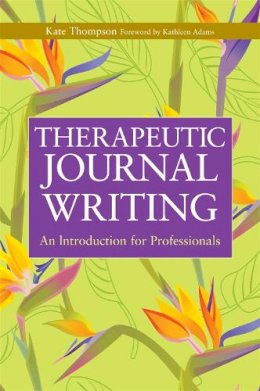
Therapeutic Journal Writing: An Introduction for Professionals
Kate Thompson
Writing a journal is not just about keeping a record of daily events - journal writing provides a unique therapeutic opportunity for facilitating healing and growth.
The author of this book guides the reader through developing journal writing to use as a therapeutic tool. Keeping a journal can help the writer to develop a better understanding of themselves, their relationships and the world around them, as well as improve skills of problem-solving, decision-making and planning. As such, journal writing can be a powerful complement to verbal therapy, offering an effective and affordable way of extending support to troubled clients. The book includes advice on working with individuals, facilitating a therapeutic writing group, proposed clinical applications, practical techniques, useful journal prompts, exercises and case vignettes.
This clear guide to the basics of journaling and its development as a therapeutic medium will be a valuable handbook for therapists, health and social care practitioners, teachers, life coaches, writing facilitators and any professional seeking personal development in themselves or their clients.
Product Details
About Kate Thompson
Reviews for Therapeutic Journal Writing: An Introduction for Professionals
Therapeutic Communities Journal ... this is a wide ranging and user friendly source book, Kate Thompson has thoroughly covered the material available. It will be of use to anyone looking for new and effective ways to gain insight into either themselves or the people they work with and care for. It lays the foundation for all technical books in the field and is that rare thing in a psychology book; the material won't date and so makes a timeless, worthwhile investment.
Private Practice (formerly Independent Practitioner) and Sussex Counselling & Psychotherapy Journal I believe therapists at all levels will find something of interest in this book, from the trainee struggling with the prescribed task of completing a 15,000 word journal early in their training, to the therapist looking for a tool for the long term, or for clients in time-limited therapy.
Therapy Today This book will help practitioners to challenge clients to experiment with different ways of telling their story in order to better understand themselves and explore their personal realities more deeply. Writing as therapy is a powerful process, and here are some practical and robust guidelines to engage with it safely and creatively.
Emmy van Deurzen, Director, New School of Psychotherapy and Counselling, London, UK This book is an excellent introduction to the therapeutic aspect of journal writing for anyone who has seen journal writing as simply keeping a form of diary or never approached the topic before. It offers a structured approach to therapeutic journaling, from a consideration of the tools required and the arrangement of physical space needed, to the variety of ways to adopt and adapt journaling in one's life for different purposes, such as time management and extending one's personal therapy... As an experience counsellor and group work facilitator, I felt both curious and inspired by the variety of exercises and prompts I could offer to my clients to extend our therapeutic work together. I also appreciated the guidance offered in building and maintaining boundaries to ensure safe practice of therapeutic writing. As a seasoned supervisor integrating creative techniques in my practice, I was excited by the passionate enthusiasm to work therapeutic journaling into my approach, as well as to use those techniques for my own self-supervision.
Lapidus Journal When I first read this book I suddenly felt an immediate connection with what she was saying. Her distinct writing style and the way she communicates her ideas as well as how she guides you through the journal writing process is simply brilliant. I wish I had been able to read this book years ago because I would have got so much more from my own journal writing. I can see how it could also have a use as a form of self supervision by allowing one's true thoughts to surface in the creative process... I found Thompson's book an insightful journey through therapeutic writing via a journal and I would recommend it to anyone working therapeutically with clients or as a supervisor or teacher of therapists.
British Association of Play Therapists. The practice of therapeutic journal writing is a very practical tool for: health professionals, teachers, lecturers, social workers and writing tutors. It is also recommended for counsellors and life coaches... Therapeutic journal writing and other forms of expressive writing may, therefore, well be seen as part of occupational therapy, rather than as a separate discipline... Kate Thompson, the author, offers many techniques for therapeutic journal writing...While the practice contexts for journal writing include education, health and social care and creative and cultural settings, it is up to the reader to create opportunities for writing groups in each individual work setting. Perhaps the best scope is in rehabilitation centres and hostels, elderly day care, or other settings where people are given time to think with supportive facilitators... Practitioners who develop therapeutic writing skills can make an important contribution to rehabilitation of patients with physical symptoms, chronic illness, survivors of childhood sexual abuse, family relationship issues and bereavement. This is, perhaps, one of the best ways of practising person-centred care, which could be a cost-saving exercise in the context of preventive medical and social care...offers (...) invaluable information for health professionals, teachers, lecturers and writing tutors.
Dr. Margot Lindsay, Research Department of Mental Health Sciences
European Journal for Person Centered Healthcare
